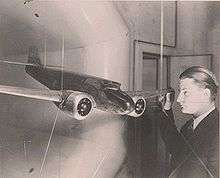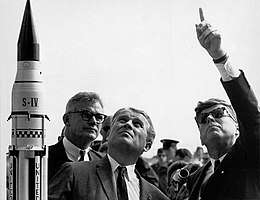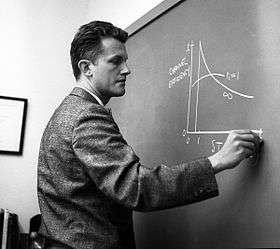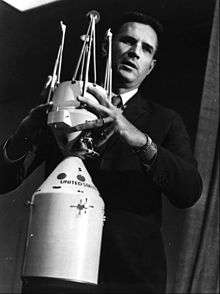List of systems engineers
This is a list of notable systems engineers, people who were trained in or practice systems engineering, and made notable contributions to this field in theory or practice.
A
- James S. Albus (1935–2011), American engineer, founder of NIST Intelligent Systems Division
- Genrich Altshuller (1926–1998), Russian engineer; inventor of TRIZ, Theory of Inventive Problem Solving
- Arnaldo Maria Angelini (1909–1999), Italian engineer; Professor of Electrotechnics at the Sapienza University of Rome[1]
- Fred Ascani (1917–2010), American Major General, "father of systems engineering at Wright Field"
B
- Dave Bennett
- Benjamin Blanchard, Virginia Polytechnic Institute; SE educator; author of texts on systems engineering and related disciplines[2]
- Wernher von Braun (1912–1977), chief architect of the Saturn V launch vehicle[3]
C
- Peter Checkland (born 1930), British management scientist and emeritus professor of Systems at Lancaster University; developer of soft systems methodology (SSM), a methodology based on a way of systems thinking
- Boris Chertok, Rocket Space Corporation "Energy", Moscow, Russia; 2004 Simon Ramo Medal winner for significant contributions to systems engineering and technical leadership of control systems design for the orbiting space station Mir[1]
- Harold Chestnut (1918–2001), American electrical engineer and systems engineer; first president of the International Federation of Automatic Control (IFAC)
- John R. Clymer (born 1942), researcher, practitioner, and teacher in the field of systems engineering; INCOSE Fellow; expert in conceiving, engineering, and demonstrating computeraided design tools for context-sensitive, self-adaptive systems
- Donald A. Coggan (born ca. 1945), American engineer and consultant in the field of value engineering; developed the Intelligent Building Database in 1985, which identified the services that an intelligent building could offer, the technology that would be required for these services, and which national and international markets were best suited for these services
- Mary (Missy) Cummings, Associate Professor of Aeronautics and Astronautics at the Massachusetts Institute of Technology; one of the first female fighter pilots in the U.S. Navy
E
F
- Wolt Fabrycky, Virginia Polytechnic Institute; SE educator; author of texts on systems engineering and related disciplines[2]
- Irmgard Flügge-Lotz, Stanford University, developed discontinuous automatic control and laid the foundation for automatic on-off aircraft control in jets
- Kevin Forsberg[2]
- Jacque Fresco, project director at The Venus Project
G
- Tom Gilb (born 1940), American systems engineer; inventor of Planguage and Evolutionary Project Management
- Harry H. Goode (1909–1960), American computer engineer and systems engineer; professor at University of Michigan; until his death he was president of the National Joint Computer Committee (NJCC); with Robert Engel Machol, he wrote the famous System Engineering Handbook
- William Gosling (born ca. 1930), British electrical engineer, Emeritus Professor of Electrical Engineering at the University of Bath, and pioneer of system design in electrical engineering
H
- Arthur David Hall III (1925–2006), American electrical engineer; worked at Bell Labs; one of the founders of the IEEE; was among the first general systems theorists; wrote A Methodology of Systems Engineering from 1962
- David Heebner, consultant; recipient of 2003 Simon Ramo Medal for leadership in introducing towed line array sonar systems for long range detection of submarines[1]
- Derek Hitchins[2] (born 1935), British systems engineer; professor in engineering management, in command & control and in systems science at the Cranfield University, Bedfordshire, England
I
- Junichi Iijima (born 1954), Japanese computer scientist; professor of the Department of Industrial Management and Engineering at the Tokyo Institute of Technology
J

Clarence Johnson
- Gwilym Jenkins (1933–1982), British statistician and systems engineer; professor of Systems Engineering at Lancaster University; best known for the Box–Jenkins methodology for fitting time series models
- Clarence "Kelly" Johnson (1910–1990), American aircraft engineer and aeronautical innovator; worked for Lockheed for more than four decades, playing a leading role in the design of over 40 aircraft, and acquiring a reputation as one of the most talented and prolific aircraft design engineers of the 20th century
K
- Rudolf Emil Kalman (born 1930), American-Hungarian mathematical system theorist; an electrical engineer by training
- George Klir (born 1932), Czech-American computer scientist and professor of systems sciences at the Center for Intelligent Systems at the Binghamton University in New York; author of several texts on systems, including Architecture of Systems Problem Solving
- Sergei Pavlovich Korolev, Russian rocket and space systems designer beating the Americans during the Cold War times "space race" by Sputnik and putting the first man in space (Gagarin); his rocket and capsule designs are in principle still in use for supplying the International Space Station (Proton, Soyuz)
- Kurt Kosanke (born ca. 1945), German engineer, retired IBM manager, director of the AMICE Consortium and consultant; known for his work in the field of enterprise engineering, enterprise integration and CIMOSA
- Kitaw Ejigu (February 25, 1948 – January 13, 2006), Ethiopian American scientist who worked for NASA as Chief of Spacecraft and Satellite Systems; engineer known for his work on design of space shuttles and spacecrafts and made a great influence in NASA
L
- Robert J. Lano, systems engineer at TRW corporation; originator of the N2 chart[4]
- Donald J. Leonard (born 1933), American engineer, AT&T executive, received the 1996 IEEE Simon Ramo Medal
- Donald H. Liles (born ca. 1948), American systems engineer; Emeritus Professor at the University of Texas at Arlington
M
- Robert Engel Machol (1917–1998), early American systems engineer
- Richard J. Mayer (born 1939), American engineer, developer of IDEF family of modeling languages
- John S. Mayo (born 1930), American engineer; seventh president of Bell Labs
- Harold Mooz,[2] INCOSE systems engineering pioneer (2001); author of Visualizing Project Management (1996) and Communicating Project Management (2003); contributing author to The Wiley Guide to Managing Projects (2004); recipient of the CIA Seal Medallion
- Philip M'Pherson, British systems engineer; founder of the Department of Systems Science at City University[2]
- George Mueller (1918–2015), American engineer; associate administrator of NASA during Apollo Program; pioneer of the "all-up" testing concept
N
- James G. Nell (born 1938), American engineer; principal investigator of the Manufacturing Enterprise Integration Project at the National Institute of Standards and Technology (NIST); known for his work on enterprise integration
O
- Hermann Oberth (1894–1989), Romanian/German space pioneer; derived basic rocket equations and described in principle all features of rockets and space stations still valid today; author of Die Rakete zu den Planetenraeumen (1923) and Wege zur Raumschiffahrt (1929); mentor of Wernher von Braun
- Tuncer Őren (born ca. 1935), Turkish/Canadian systems engineer; professor emeritus of Computer Science at the School of Information Technology and Engineering (SITE) of the University of Ottawa
P
- Bradford Parkinson, American professor of Aeronautics and Astronautics at the Stanford University; recipient of the Simon Ramo Medal for leading the concept development of GPS[1]
- Samuel C. Phillips (1921–1990), USAF general; Director of NASA's Apollo Manned Lunar Landing Program
R

- Simon Ramo (1913–2016), American physicist, engineer, and business leader; led development of microwave and missile technology; sometimes known as the "father of the ICBM"[2]
- Eberhardt Rechtin (1926–2006), American systems engineer and respected authority in aerospace systems and systems architecture[2]
- Allen B. Rosenstein (born 1920), American systems engineer and Professor of Systems Engineering at the University of California at Los Angeles
S
- Andrew P. Sage, School of Information Technology and Engineering, George Mason University; recipient of the 2000 Simon Ramo Medal for outstanding contributions to the field of systems engineering;[1] series editor of a textbook series on systems engineering and management for John Wiley & Son[2]
- Robert Seamans, NASA Deputy Administrator and MIT professor
- Joseph Francis Shea, systems engineer on the Titan I ballistic missile; head of the Apollo Spacecraft Program Office[5]
- Nikolai Sheremetevsky, Advisor to Director, All Russia Institute for Electromechanics; recipient of the 2004 Simon Ramo Medal for significant contributions to systems engineering and technical leadership of control systems design for the orbiting space station Mir[1]
- Neil Siegel, Vice-President and Chief Engineer of the Northrop Grumman Corporation; lead systems engineer for many US Army systems; member of the US National Academy of Engineering; Fellow of the IEEE; recipient of the Simon Ramo Medal in 2011 for his work on the US Army's digital battlefield system
- William W. Simmons (born 1932), American physicist and development of electro-optical devices
- Edward Sussengeth (born 1932), American engineer, developer of APL programming language and multiple IBM computer systems
- Alistair Sutcliffe (born 1951), British engineer; professor at University of Manchester
T
- Arnold Tustin (1899–1994), British engineer; Professor of Engineering at the University of Birmingham and at Imperial College London; made important contributions to the development of control engineering and its application to electrical machines
W
- John N. Warfield (born 1926), American electrical engineering and systems scientist; member of the Academic Committee of the International Encyclopedia of Systems and Cybernetics
- Kevin Warwick (born 1954), Deputy Vice-Chancellor (Research) at Coventry University; previously Professor of Cybernetics at the University of Reading; best known for his implant research linking humans and technology as a system
- Brian Wilson (born 1933), British systems scientist and honorary professor at Cardiff University; known for his development of soft systems methodology (SSM) and enterprise modelling
- A. Wayne Wymore (born 1927), American mathematician and systems engineer; founder and first Chairman of Systems and Industrial Engineering (SIE) Department at the University of Arizona;[2] one of the first Fellows of International Council on Systems Engineering (INCOSE)
gollark: Hmm, guess they didn't notice the backdoors.
gollark: Ah yes. The testing code I definitely wrote for this round, because I'm Lyxal and picked it.
gollark: That's not in our apioform database.
gollark: No, I always wrote those.
gollark: This simple rule has never led astray.
See also
- Lists of engineers – for lists of engineers from other disciplines
- List of systems scientists
- People in systems and control
- List of systems engineering at universities
- INCOSE Pioneer Award
References
- IEEE. "IEEE Simon Ramo Medal Recipients". Retrieved 2007-05-08.
- INCOSE. "INCOSE – Pioneers". Archived from the original on 2007-04-17. Retrieved 2007-05-09.
- NASA MSFC History Office. "Biography of Wernher Von Braun". Archived from the original on 2013-09-22. Retrieved 2007-05-09.
- Hitchins, Derek (May 1993). Putting Systems To Work. John Wiley & Sons Inc. ISBN 0-471-93426-7.
- NASA Johnson Space Center Oral History Project. Biographical Data Sheet – Joseph Francis Shea. 16 July 1998.
This article is issued from Wikipedia. The text is licensed under Creative Commons - Attribution - Sharealike. Additional terms may apply for the media files.

